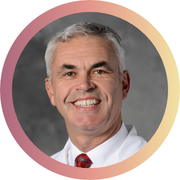
Prof. Doreen Addrizzo-Harris
United States
Prof. Doreen Addrizzo-Harris (United States)

Doreen J. Addrizzo-Harris, MD, FCCP, is a pulmonary/critical care physician with an extensive background in bronchiectasis and non-tuberculous mycobacterial infection and medical education. Dr. Addrizzo-Harris is currently a Professor of Medicine at the NYU Grossman School of Medicine. She serves as the Associate Division Director for Clinical and Faculty Affairs, is the Director of the NYU Bronchiectasis and NTM Program, and is Co-Director of the NYU Pulmonary Faculty Practice. She is now serving in her 20th year as the Program Director of NYU’s Pulmonary and Critical Care Medicine Fellowship.
Dr. Addrizzo-Harris received her medical degree and completed her residency and fellowship training at New York University School of Medicine. Since completing her training, she was recruited to stay as a faculty member at NYU, where she has been a critical presence over the past 25 years. She has been instrumental in educating the next generation of pulmonary/critical care physicians and has won a number of awards for her teaching skills, most recently, the 2020 first place Program Director of the ATS Best Practice Program. Dr. Addrizzo-Harris has served on the board of the Association of Pulmonary and Critical Care Medicine Program Directors (APCCMPD), including serving as President from 2006-2007. Academically she authored 39 peer-reviewed publications and 54 scientific abstracts presented at international conferences. She has participated in numerous clinical trials, many as PI. Dr. Addrizzo-Harris has been recognized as a Distinguished CHEST Educator each year since its inception since 2017 and received the Distinguished Service Award in 2019.
During her leadership tenure with CHEST, Dr. Addrizzo-Harris has served on the Marketing Committee, the Health and Science Policy Committee (Chair from 2007-2009), Government Relations Committee, Scientific Program Committee, Education Committee, Governance Committee, Editorial Board for CHEST Physician, Professional Standards Committee (Chair 2016-2018), Board of Regents, and CHEST Foundation Board of Trustees. Most recently, Dr. Addrizzo-Harris served as the President of the CHEST Foundation from 2018-2019 and Co-Chair of the Foundation Awards Committee from 2015-2020. Dr. Addrizzo-Harris will serve as the sixth women to lead the American College of Chest Physicians.

Prof. John Balmes
United States
Prof. John Balmes (United States)

Dr. Balmes is Professor of Medicine Emeritus at the University of California, San Francisco (UCSF) and Professor of Environmental Health Sciences Emeritus in the School of Public Health at the University of California, Berkeley (UC Berkeley). He is an Attending Physician in the UCSF Division of Occupational, Environmental and Climate Medicine and the Division of Pulmonary and Critical Care Medicine at the Zuckerberg San Francisco General Hospital. At UC Berkeley, he is one of the Principal Investigators of the Children’s Health and Air Pollution Study (CHAPS) in Fresno, California. Dr. Balmes has been studying the effects of occupational and environmental agents on respiratory, cardiovascular, and metabolic health for over 40 years. He was appointed Physician Member of the California Air Resources Board in 2008.

Prof. Charles L. Daley
United States
Prof. Charles L. Daley (United States)

Charles L. Daley, M.D., is Chief of the Division of Mycobacterial and Respiratory Infections at National Jewish Health (NJH) and Professor of Medicine at NJH, the University of Colorado, and Icahn School of Medicine at Mount Sinai. Prior to coming to NJH, he was medical director of the Curry Training Center at the University of California, San Francisco. Dr. Daley has served on and chaired expert panels for the World Health Organization (WHO), Centers for Disease Control and Prevention (CDC), Infectious Diseases Society of America and American Thoracic Society. He Chaired the revision of the multi-society sponsored NTM Treatment Guideline. Dr. Daley chaired the Green Light Committee, gGLC, and Global Drug Resistance Initiative (GDI) for the Stop TB Partnership and World Health Organization. For his work with MDR-TB he was awarded the World Lung Health Award by the American Thoracic Society. He was previously Associate Editor of the American Journal of Respiratory and Critical Care Medicine and The European Respiratory Journal and is now Associate Editor of Frontiers in Tuberculosis. His academic interests include TB global health policy and clinical and translational research related to TB, NTM infections and bronchiectasis.

Prof. John Marini
United States
Prof. John Marini (United States)

John J. Marini, M.D. Professor of Medicine, University of Minnesota (USA). He was educated and trained at Johns Hopkins School of Medicine and at the University of Washington. Presently Dr. Marini is a member of numerous editorial boards, an author and editor of 11 medical textbooks, and contributor to more than 350 scientific and educational articles. His investigative work has always concentrated in understanding the cardiopulmonary physiology and management of acute respiratory failure, with an emphasis on defining the mechanisms underlying the patient-ventilator interactions which occur during critical illness. In the majority of that research, he has been positioned at the interface between basic physiology and clinical medicine so as to develop mechanistic insights that advance clinical practice. Refining our understanding of ventilator-induced lung injury is a theme he currently pursues with collaborators at the bench, laboratory, and clinical levels.

Prof. Fernando J. Martinez
United States
Prof. Fernando J. Martinez (United States)

Fernando J Martinez is Chief of the Division of Pulmonary and Critical Care Medicine at Weill Cornell Medical College, New York. Prior to this appointment, he was Professor of Internal Medicine and Associate Chief for Clinical Research in the Division of Pulmonary and Critical Care Medicine at the University of Michigan Health System, Ann Arbor, Michigan, as well as Medical Director of its Pulmonary Diagnostic Services and Co-Medical Director of the Lung Transplantation Program. After graduating from the University of Florida School of Medicine, Gainesville, Florida, he completed a residency in internal medicine at Beth Israel Hospital, Boston, Massachusetts, and a fellowship in pulmonary medicine at the Boston University Pulmonary Center. He received a Masters in Biostatistics and Clinical Study Design from the University of Michigan School of Public Health.
Professor Martinez’s main research interests include the biological underpinnings and therapeutic approaches to interstitial lung diseases (ILD) and chronic obstructive pulmonary disease (COPD). He is a member of numerous societies, including the American Thoracic Society (ATS), the European Respiratory Society (ERS), the American College of Chest Physicians, and in the past the Fleischner Society. Previously, he was a member of the ATS Committees which generated guidelines for the management of COPD, respiratory infections, idiopathic pulmonary fibrosis, and cardiopulmonary exercise testing. He is the former Chair of the Clinical Problems Assembly of ATS. Professor Martinez is a member of the GOLD Science Committee and sits on a number of editorial boards, including for Journal of COPD and American Journal of Respiratory and Critical Care Medicine. He serves as the Editor-in-Chief for the latter.

Dr. Reena Mehra
United States
Dr. Reena Mehra (United States)

Dr. Mehra is a physician scientist, Professor of Medicine of the Cleveland Clinic Lerner College of Medicine of Case Western Reserve University and Director of Sleep Disorders Research focused on investigation of sleep disorders and health outcomes with a focus on cardiopulmonary disease. She has almost 20 years of experience in the conduct of clinical and translational science and leading the Sleep Coordinating Center for multicenter studies. She is Chair of the American Heart Association Statement on Sleep Apnea and Cardiac Arrhythmia, Co-Chair of the NHLBI Autonomic Nervous System Cardiopulmonary Interactions workshop, immediate past Chair of the American Thoracic Society Sleep Respiratory Neurobiology Assembly, Chair of the American Academy of Sleep Medicine Inpatient Diagnostic Sleep Testing Task Force, and Associate Editor of the American Journal of Respiratory and Critical Care Medicine. Dr. Mehra has over 200 publications, delivered >300 lectures and mentored more than 40 trainees

Prof. Patricia Rivera
United States
Prof. Patricia Rivera (United States)

Dr. Rivera joined the University of Rochester in 2022 as the C. Jane Davis & C. Robert Davis Distinguished Professor in Pulmonary Medicine, Chief of the Division of Pulmonary and Critical Care Medicine, and Associate Director of Diversity, Equity, and Inclusion at Wilmot Cancer Center in the University of Rochester Medical Center, Rochester, New York.
Her expertise includes screening, diagnosing, staging lung cancer, and managing treatment complications.
Before moving to Rochester, NY, Dr. Rivera was a Tenured Professor of Medicine in the Pulmonary and Critical Care Medicine Division at Chapel Hill University of North Carolina (UNC). She co-founded the first Multidisciplinary Thoracic Oncology Program in 1995, paving the way for pulmonologists to contribute to the care of lung cancer patients. In 2015 she developed the Multidisciplinary Lung Cancer Screening Program at UNC.
Dr. Rivera Co-developed and Co-directs the North Carolina Lung Screening Registry, a research registry that partners with community and academic imaging sites across the state to generate real-world evidence on the delivery, quality, and outcomes of lung cancer screening. She is an NIH/NCI-funded researcher and collaborates with colleagues at URMC to examine interventions that can improve lung cancer screening rates at URMC and the catchment area.
Throughout her career, Dr. Rivera has held numerous leadership positions in professional societies including Chest, the National Lung Cancer round Table, and the American Thoracic Society.
Dr. Rivera is passionate about teaching, mentoring, and developing the next generation of leaders and increasing the representation of women and underrepresented groups in pulmonary and critical care medicine.

Prof. Michael J. Simoff
United States
Prof. Michael J. Simoff (United States)

Michael J. Simoff has practiced Interventional Pulmonology for 29 years and has been involved in technology development including: EBUS-TBNA, ENB, confocal microendoscopy, OCT, autofluorescence bronchoscopy, and APC as examples. He is a Professor of Medicine, FTA at Wayne State School of Medicine. He has published more than 180 peer-reviewed works, given more than 230 international and national talks, and has been funded more than $18million for research. He has served on international and national committees throughout his career in interventional pulmonology and lung cancer. He is currently the Director of Interventional Pulmonology and Lung Cancer Screening at Henry Ford Hospital. He also works as an Associate Medical Officer for Intuitive, working on new technology development and design of research surrounding this work.
When not at work, he looks forward to spending time with his wife of 34 years. He also enjoys traveling, photography, hiking, golfing, cycling, woodworking, gardening, and he is a beekeeper.

Asst Prof. Pratik Sinha
United States
Asst Prof. Pratik Sinha (United States)

Asst Prof. Sinha is a physician-scientist trained in the U.K. and practicing in the U.S. His research interests include lung biology and immune responses, respiratory physiology, and data science. As a clinician, he specialises in Intensive Care and Emergency Medicine. His group are studying molecular biology in critical care syndromes such as sepsis and ARDS. He uses multidimensional biological and clinical data to find biologically homogeneous subgroups in ARDS and sepsis with a view to developing precision-based care in the ICU. As a data scientist he uses cutting-edge tools to understand biological data at a population-wide level and to seek subgroups in clinical trials that may be treatment responsive or how we can better design trials that can evaluate treatment efficacy at an individual level. Through these novel tools he hopes to improve patient outcomes by matching the right therapies to the right patient at the right time.